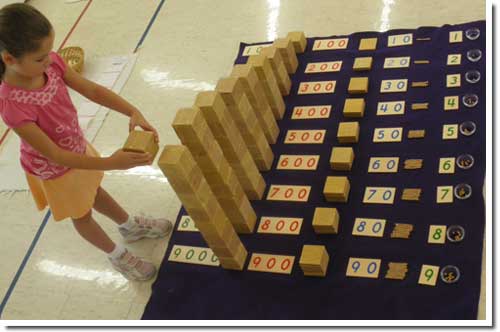American Montessori Society
281 Park Avenue South
New York, NY 10010
The Montessori Method
One basic idea of the Montessori philosophy is that carried unseen within each child is the person that child can become. To develop his/her physical, Intellectual, and spiritual powers to the fullest, the child must have freedom - a freedom achieved through order and self-discipline. The child’s world is full of sights and sounds which at first appear chaotic. From this chaos, the child gradually creates order and learns to distinguish among the impressions that assail his/her senses, slowly gaining mastery of self and of his/her environment.
Dr. Montessori developed what she called “the prepared environment.” Among its features is an ordered arrangement of learning materials in a non-competitive atmosphere which helps each child develop at his/her own rate.
 |
“Never let the child risk failure until he has a reasonable chance of success,” said Dr. Montessori, understanding the need to acquire basic skills before participating in a competitive learning situation. The years between three and six are those when a child learns the ground rules of human behavior most easily. These years can be devoted constructively to preparing the child to take his/her place in society through the acquisition of good manners and habits.
Children who have had the benefit of a Montessori environment are more free later to devote themselves to the development of their intellectual faculties. The method by which children are taught in the Montessori school might be called “programmed learning.” Its structure involves the use of many materials with which the child may work by him/herself. The teaching materials are designed to test understanding and to correct the child’s errors at every step. |
Dr. Montessori recognized that self-motivation is the only valid impulse to learning. Children move themselves toward learning. The teacher prepares the environment, programs the activities, functions as the reference person and example, and offers the child stimulation. But it is the child who learns, motivated through the work itself, to persist in his/her chosen task. The Montessori child is free to learn because he/she has acquired an “inner discipline” from exposure to both physical and mental order.
This is the core of Montessori’s educational philosophy. Habits of concentration, stick-to-itiveness, and thoroughness established in early childhood produce a confident and competent learner in later years. Historically, schools have taught children to observe, to think, to judge. Montessori introduces children to the joy of learning at an early age and provides a framework in which intellectual and social discipline go hand-in-hand.
The American Montessori Society emphasizes the importance of Montessori insights for children of all ages and adults. Although traditionally, children begin Montessori education at about three, the principles of self-motivated learning apply to all learning experiences. Modern research has validated Dr. Montessori’s principles of programmed learning and of the non-teacher (one who does not distort or inhibit the learning experience). Many public, private, and parochial elementary and secondary schools now use this approach.
Major Courses of Study
What is the Montessori Method and how does it apply the Principles of the Method Courses:
- Practical Life and Motor Skills Education
- Sensorial Development of Language
- Early Development of the Mathematical Mind
Downloadable Forms
Adobe Acrobat Reader is required to view these documents.
MTTI Application for Admission [PDF]
MTTI 2024-2025 Schedule [PDF]
MTTI Tuition Payment Schedule 2024-2025 [PDF]
MTTI Codes of Rights and Responsibilities [PDF] |